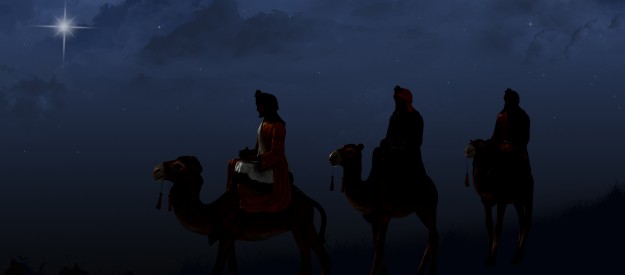"We are losing our attitude of wonder, of contemplation, of listening to creation and thus we no longer manage to interpret within it what Benedict XVI calls 'the rhythm of the love-story between God and man.'"
+ Pope Francis
Three Epiphany lessons for the rest of the year

I came across a little gem today on Twitter. It summed up my favorite Epiphany themes as well as a few thoughts I had today at Mass.
The Tweet was from a Capuchin Friar who Tweets under the handle @FrCharles. It said simply this:
Sermons don't often note this, but it's good to recall that Epiphany is the end of astrology. From the incarnation forward, creation, properly interpreted, points to Jesus Christ.
-- Charles, OFM Cap. (@FrCharles) January 6, 2019
There’s a lot in those few words. For Catholics engaged in eco-protection, I suggest we ponder and pray over them in light of the following Epiphany realities.
1. Human reason is ordered to Christ
The magi from the East were born and bred in a pagan world but their use of human reason allowed them to explore creation—to seek its mysteries—and so come to the truth about Jesus Christ.
Their journey from darkness to light was a literal one, yes. But also spiritual. How else could they have been open to the ancient prophecies of Israel? How else could they have been open to divine inspiration regarding the true intentions of Herod? How else could they have known the truth of the poor child they encountered?
And so the takeaway: Human nature itself is oriented to seek Christ. Our souls long for truth and our reason has the capacity to follow it. And that makes Christ accessible to all people—that is, all those brave enough to set out and seek.
2. Creation is ordered to Christ.
As Father Charles Tweeted, “creation, properly interpreted, points to Jesus Christ.”
But then, what should you expect of a created order that was made good and orderly in the beginning, as the Book of Genesis reveals to us? Indeed, this understanding runs strong and sure through Christian thought. From Holy Scripture through the life of the Church, we find again and again this inescapable truth: the study of creation—whether scientifically, artistically, or in quiet, prayerful reflection—helps us better know the Creator.
Indeed, in proclaiming that the Word became flesh, as John's Gospel reveals, we Christians make a profound proclamation about the goodness of things like water, minerals, organic molecules, and human embryos.
And so the takeaway, as noted by Saint Bonaventure: "Every creature proclaims God's existence."
And that means that all people, especially those of faith, are called to care for the created order—yes, all creatures, and thus all people, and thus all souls.
3. The centrality of the Cross
As I’ve posted about elsewhere, if creation is ordered to Christ, then it is ordered to Christ’s Cross—and beyond to Easter.
The magi knew this. Their gifts tell us so. Gold, the gift for a king—in this case, the King of kings. Frankincense, the gift for a priest—in this case, Christ, the High Priest. And myrrh, the fragrant ointment for embalming the dead—in this case, He who is Life itself. He who conquers death.
The hymn We Three Kings celebrates all this, although sadly few liturgies allow all the verses to be sung and few priests preach about it, much as Fr. Charles lamented.
But sing along for yourselves:
Myrrh is mine, its bitter perfume
Breathes of life of gathering gloom
Sorrowing, sighing, bleeding, dying
Sealed in the stone-cold tomb
O Star of wonder, star of night
Star with royal beauty bright
Westward leading, still proceeding
Guide us to Thy perfect light
Glorious now behold Him arise
King and God and Sacrifice
Alleluia, Alleluia
Earth to heav'n replies
And so the takeaway: The Cross is central to what it means to be Christian—a truth known at Christ's birth even by pagan astrologers. A truth that remains fixed until the end of time.
And so let us journey, seek, and find. And while we must do so preaching Christ Crucified, as we carry our own crosses, we know that we are also promising Christ Victorious. Christ, who makes all things new.
A blessed Epiphany to you and yours, and may its meaning and messages be with us always as together we work to protect all creation—all ecosystems, all human life, all souls—by seeking first Our Lord and Savior, Jesus Christ.


















